Buying a Puppy: What Breed Should I Choose?
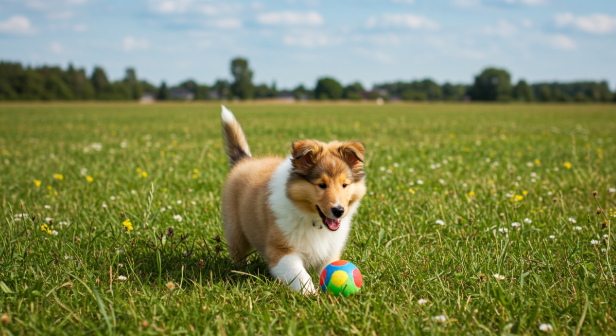
Bringing a puppy into your home is an exciting and joyful experience. However, choosing the right breed is a crucial decision that will impact your lifestyle, time, and happiness for years to come. Here are some key factors to consider when selecting a puppy breed:
- Lifestyle and Activity Level
Evaluate your daily routine and activity level. Some breeds require lots of exercise and mental stimulation, such as Border Collies and Labrador Retrievers, while others like Bulldogs or Basset Hounds are more laid-back. Choose a breed that matches your energy level to ensure a happy, well-adjusted dog. - Size and Space
Consider the size of your living space. Larger breeds like Great Danes or Saint Bernards need more room to move around and may not be suitable for small apartments. Smaller breeds like Chihuahuas or Pomeranians adapt well to limited space. - Temperament and Personality
Different breeds have varying temperaments. Some dogs are naturally protective, others are very social and friendly, and some may be more independent. Research the breed’s typical personality traits to find one that fits your family and lifestyle. - Grooming and Maintenance
Some breeds require regular grooming and special care. For example, Poodles and Shih Tzus need frequent haircuts, while breeds like Beagles or Boxers have short coats that are easier to maintain. Consider how much time and effort you are willing to dedicate to grooming. - Health Considerations
Certain breeds are predisposed to specific health issues. Research common health problems associated with breeds you are interested in and consider adopting from reputable breeders who perform health screenings. - Experience Level
If you are a first-time dog owner, some breeds are more beginner-friendly, such as Golden Retrievers or Cavalier King Charles Spaniels. More independent or stubborn breeds like Afghan Hounds or Akitas may require experienced handling. - Purpose and Goals
Think about why you want a dog—companionship, protection, therapy, or activities like agility or hunting. Different breeds excel in different roles, so choose one that aligns with your goals.
A Quick Look at Several Popular Breeds
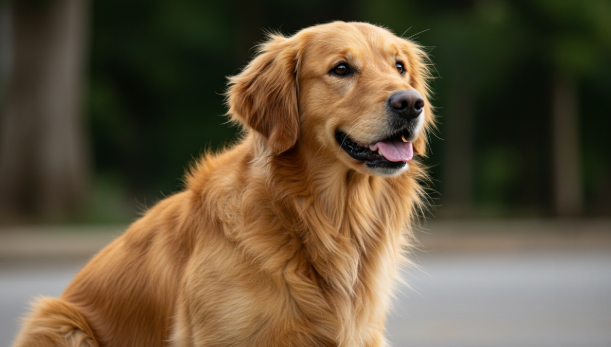
Golden Retriever
Golden Retriever Traits:
- Friendly and social: Known for their gentle and affectionate nature.
- Intelligent: Highly trainable and quick learners.
- Energetic and playful: Require regular exercise and enjoy outdoor activities.
- Loyal and trustworthy: Great family dogs and good with children.
- Adaptable: Can live in various environments if given enough attention and exercise.
- Shedding and grooming: Have a dense double coat that sheds seasonally and requires regular grooming.
- Good with other pets: Generally get along well with other animals.
Who Should Own a Golden Retriever:
- Active individuals or families who can provide daily exercise and playtime.
- People looking for a loyal and friendly companion.
- Those who have time for regular grooming and maintenance.
- Families with children, as Goldens are patient and gentle.
- First-time dog owners willing to invest time in training and socialization.
- Individuals who want a versatile dog for activities like obedience, agility, or therapy work.
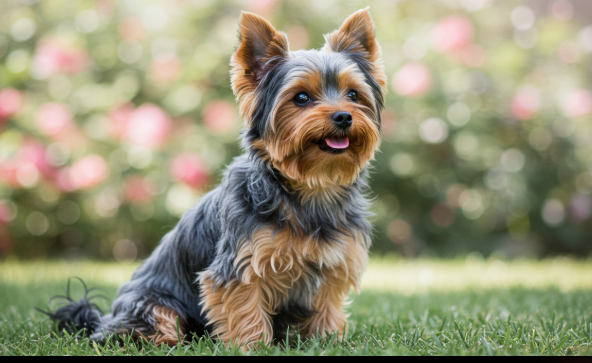
Yorkshire Terrier
Yorkshire Terrier Traits:
- Size: Small, typically weighing around 4 to 7 pounds.
- Appearance: Silky, fine, and straight coat, usually steel blue and tan in color.
- Temperament: Energetic, affectionate, and intelligent.
- Behavior: Often bold and confident, sometimes with a feisty streak.
- Lifespan: Approximately 12 to 15 years.
- Exercise Needs: Moderate; enjoys short walks and playtime.
- Grooming: Requires regular brushing and grooming to maintain coat health.
- Trainability: Highly trainable but can be stubborn; responds well to positive reinforcement.
Who Should Own a Yorkshire Terrier:
- Individuals or families looking for a small companion dog suitable for apartment living.
- People who can commit to regular grooming and maintenance.
- Owners who want an intelligent and lively pet that enjoys interaction.
- Those prepared to provide consistent training and socialization.
- People without allergies or who are okay with managing dog hair.
- Suitable for experienced dog owners or first-timers willing to learn about the breed’s needs.
- Not ideal for households with very young children due to the dog’s small size and delicate nature.
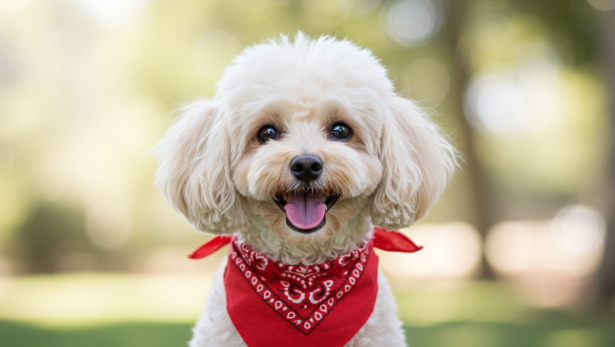
Poodle Traits:
- Intelligent and highly trainable
- Energetic and playful
- Hypoallergenic coat, low shedding
- Social and friendly with family and pets
- Alert and good watchdogs
- Require regular grooming
- Adapt well to various living environments
- Can be sensitive and need positive reinforcement training
Who Should Own a Poodle:
- Individuals or families looking for a smart and trainable dog
- People with allergies seeking a low-shedding breed
- Active owners who can provide daily exercise and mental stimulation
- Those willing to commit to regular grooming and coat maintenance
- Owners who want a friendly, social companion
- Suitable for both apartment living and homes with yards
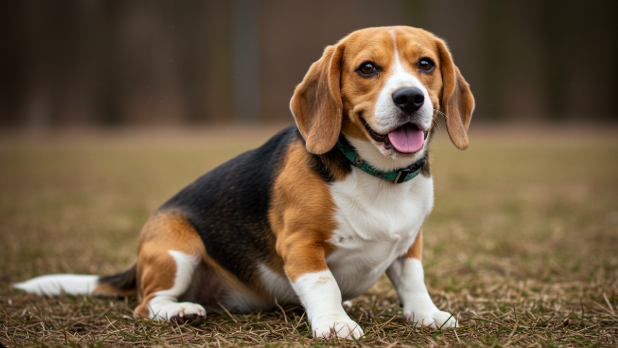
Beagle Traits:
- Size: Small to medium-sized, typically 13-15 inches tall and weighing 20-30 pounds.
- Appearance: Short coat, usually tri-color (black, white, and brown), with large floppy ears and expressive eyes.
- Temperament: Friendly, curious, and gentle. Beagles are known for their affectionate nature and sociability.
- Energy Level: High energy; requires regular exercise and enjoys outdoor activities.
- Intelligence: Intelligent and independent but can be stubborn, which may make training a challenge.
- Scent Hound: Strong sense of smell and tracking instinct, often following scents enthusiastically.
- Vocalization: Known for their distinctive baying and barking, which can be frequent.
- Lifespan: Around 12-15 years.
Who Should Own a Beagle:
- Active individuals or families who can provide regular exercise and playtime.
- People who enjoy outdoor activities such as hiking, running, or long walks.
- Owners prepared for consistent training and patient in dealing with stubbornness.
- Families with children, as beagles are generally good with kids and other pets.
- Those who have time to engage in mental stimulation to prevent boredom and destructive behavior.
- Individuals who can manage a dog that may bark frequently and follow scents, requiring secure fencing or supervision outdoors.
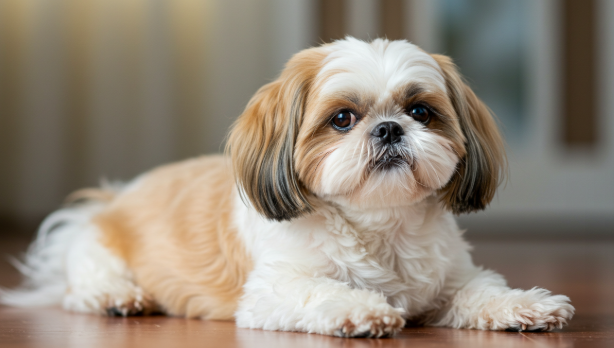
Shih Tzu
Shih Tzu Traits:
- Size: Small, typically 9-16 pounds
- Coat: Long, flowing double coat that requires regular grooming
- Temperament: Friendly, affectionate, and outgoing
- Personality: Playful, alert, and sometimes stubborn
- Exercise Needs: Moderate; enjoys short walks and indoor play
- Lifespan: Approximately 10-16 years
- Health: Prone to certain issues like brachycephalic syndrome, eye problems, and hip dysplasia
Who Should Own a Shih Tzu:
- Individuals or families looking for a small companion dog
- People willing to commit to regular grooming and coat maintenance
- Apartment or city dwellers due to their small size and moderate exercise needs
- Those who want a friendly, affectionate pet that gets along well with children and other animals
- Owners prepared to provide routine veterinary care and monitor for breed-specific health issues
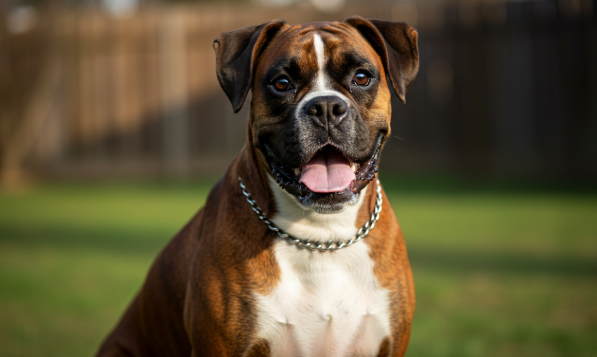
Boxer
Boxer Traits:
- Energetic and playful: Boxers are highly energetic dogs that love to play and require regular exercise.
- Loyal and protective: They are known for their loyalty to their family and can be protective, making them good watchdogs.
- Intelligent and trainable: Boxers are smart and respond well to consistent training.
- Affectionate and friendly: They are generally good with children and enjoy family interactions.
- Alert and curious: Boxers are alert and curious, often making them good companions for active owners.
- Short coat: Their short coat is easy to groom but they do shed.
Who Should Own a Boxer:
- Active individuals or families: Boxers need plenty of exercise and mental stimulation.
- Experienced dog owners: Their energy and strength can be challenging for first-time dog owners.
- Families with children: Boxers are great with kids due to their playful and protective nature.
- People who want a loyal companion: Boxers form strong bonds with their families.
- Owners who can provide time and attention: They thrive on interaction and can become bored or anxious if left alone for long periods.
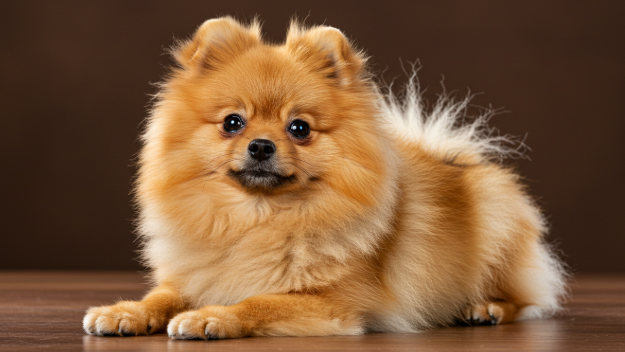
Pomeranian
Pomeranian Traits:
- Size: Small, typically weighing between 3 to 7 pounds.
- Appearance: Fluffy double coat, fox-like face, and plumed tail that curls over the back.
- Temperament: Lively, friendly, and playful. They are known for being alert and curious.
- Intelligence: Highly intelligent and quick learners, making them easy to train.
- Social: Enjoy being the center of attention and can be very affectionate with their owners.
- Energy: Moderate energy level, requiring regular short walks and playtime.
- Vocal: Can be quite vocal and may bark frequently if not trained properly.
Who Should Own a Pomeranian:
- Individuals or families looking for a small companion dog suitable for apartment living.
- People who want an affectionate and lively pet that enjoys interaction and play.
- Owners willing to invest time in grooming due to their thick double coat.
- Those who can provide consistent training and socialization to manage barking tendencies.
- People without severe allergies, as Pomeranians shed and require regular brushing.
- Owners prepared to meet their moderate exercise needs with daily walks and play sessions.
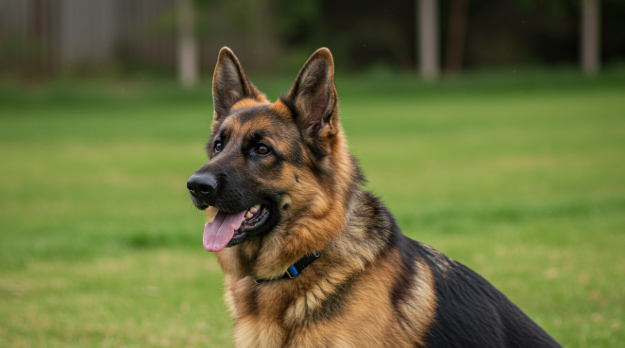
German Shepard
German Shepard Traits:
- Intelligent: German Shepherds are highly intelligent and quick learners, making them excellent working dogs in roles such as police, military, and search and rescue.
- Loyal: They are known for their strong loyalty to their owners and families, often forming deep bonds.
- Protective: Naturally protective, German Shepherds make excellent guard dogs and are alert to their surroundings.
- Energetic: This breed requires regular exercise and mental stimulation to stay happy and healthy.
- Trainable: Due to their intelligence and eagerness to please, they respond well to training and enjoy having tasks to do.
- Versatile: German Shepherds excel in various activities, including obedience, agility, herding, and service work.
- Confident and Courageous: They are brave and confident dogs, unafraid to face challenges.
Who Should Own a German Shepherd:
- Active Individuals or Families: Those with an active lifestyle who can provide daily exercise and mental challenges.
- Experienced Dog Owners: People who have some experience with dog training and handling, as German Shepherds need consistent leadership.
- Owners Looking for a Protective Companion: Those interested in a loyal and protective family dog.
- People with Time to Commit: German Shepherds thrive with attention and interaction, so owners should have time to dedicate to training and companionship.
- Working Roles: Suitable for individuals seeking a dog for specific tasks like police work, service dog duties, or search and rescue.
German Shepherds are not ideal for sedentary lifestyles or first-time dog owners who may not have the time or knowledge to meet their needs. Proper socialization and training from an early age are essential for a well-behaved and balanced dog.
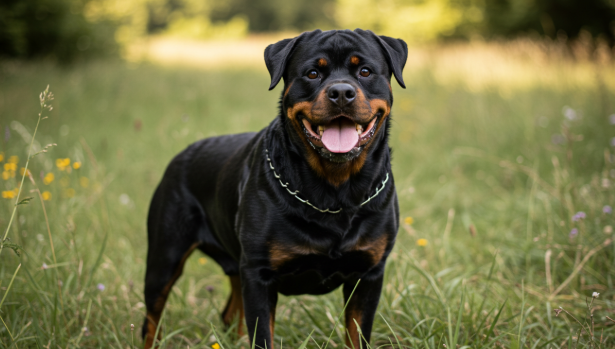
Rottweiler
Rottweiler Traits:
- Loyal and protective: Rottweilers are known for their strong loyalty to family members and their natural protective instincts.
- Confident and fearless: They are confident dogs who are often fearless in unfamiliar situations.
- Intelligent and trainable: Rottweilers are highly intelligent and respond well to consistent, positive training.
- Energetic and strong: These dogs have a lot of energy and require regular exercise to stay healthy and happy.
- Calm and gentle with family: When properly socialized, Rottweilers can be calm and gentle, especially with children and family members.
- Alert and watchful: They make excellent watchdogs due to their alert nature.
- Can be territorial: Rottweilers may be wary of strangers and protective of their home and family.
Who Should Own a Rottweiler:
- Experienced dog owners: Due to their strength and protective instincts, Rottweilers require owners who understand dog behavior and training.
- Active individuals or families: Owners should be able to provide regular exercise and mental stimulation.
- Those committed to socialization and training: Early and ongoing socialization is crucial to ensure a well-behaved Rottweiler.
- People looking for a loyal and protective companion: Ideal for those wanting a dedicated family guardian.
- Individuals with time and patience: Rottweilers thrive in environments where they receive consistent attention and guidance.
- Suitable for families with older children: With proper training, they can be good family pets, but supervision is recommended with young kids.
Rottweilers are not recommended for first-time dog owners or those unable to commit to their training and exercise needs.
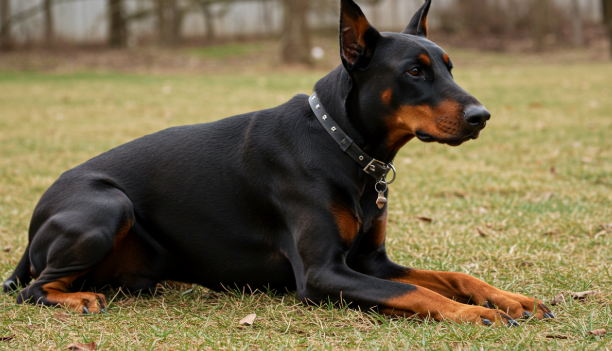
Doberman Traits:
- Intelligent: Dobermans are highly intelligent and quick learners, making them easy to train.
- Loyal: They are extremely loyal to their families and form strong bonds.
- Protective: Known for their protective nature, Dobermans make excellent guard dogs.
- Energetic: They have high energy levels and require regular exercise to stay healthy and happy.
- Alert: Dobermans are naturally alert and attentive, always aware of their surroundings.
- Affectionate: Despite their tough appearance, they can be very loving and affectionate with family members.
- Social: Early socialization is important to ensure they are well-behaved around other pets and people.
- Confident: They carry themselves with confidence and are often fearless.
Who Should Own a Doberman:
- Experienced Dog Owners: Those who have experience with training and handling strong-willed dogs.
- Active Individuals or Families: People who can provide plenty of physical and mental exercise.
- Security-Conscious Owners: Individuals looking for a protective companion.
- Committed Trainers: Owners willing to invest time in consistent training and socialization.
- Families with Older Children: Dobermans can be great family dogs but may be better suited for families with children old enough to understand dog behavior.
- People with Space: They do best in homes with enough space for them to move and play.
Dobermans thrive in environments where they receive proper training, socialization, and plenty of attention. They are best suited for owners ready to meet their physical and mental needs.erful companions for the right owner who can meet their physical and mental needs while providing love and structure.Replace selected
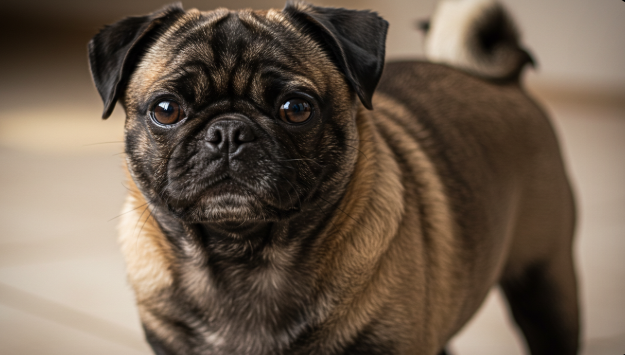
Pug
Pug Traits:
- Small, sturdy, and compact body
- Distinctive wrinkled face with large, round eyes
- Short, smooth coat that comes in fawn, black, or silver
- Friendly, affectionate, and sociable personality
- Playful but can be stubborn
- Moderate exercise needs; enjoys walks and playtime
- Can be prone to breathing issues due to brachycephalic (flat-faced) structure
- May experience eye problems and skin infections in facial folds
- Requires regular grooming and cleaning of facial wrinkles
- Generally good with children and other pets
Who Should Own a Pug:
- Individuals or families looking for a small companion dog
- People who want a friendly, affectionate pet that enjoys being indoors
- Owners who can provide regular grooming and monitor health issues
- Those who understand the special care needs related to breathing and eye health
- Suitable for apartment living due to their size and exercise needs
- Not ideal for highly active owners seeking a vigorous running companion
- Best for owners willing to invest time in socialization and gentle training
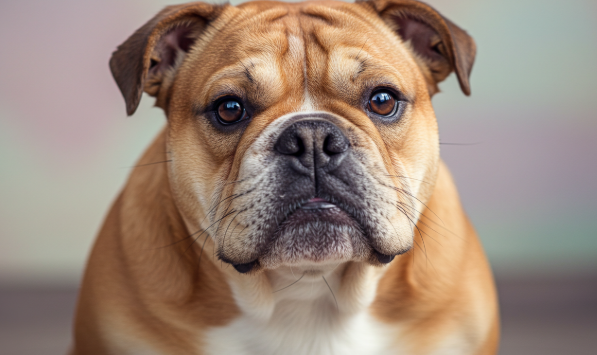
Bulldog
Bulldog Traits:
- Appearance: Bulldogs have a distinctive wrinkled face, pushed-in nose, and a muscular, stocky build.
- Temperament: They are known for being gentle, affectionate, and loyal. Bulldogs are generally good-natured and friendly.
- Energy Level: Bulldogs have a low to moderate energy level. They enjoy short play sessions but are not overly active.
- Social Behavior: They tend to be good with children and can get along well with other pets when properly socialized.
- Health Considerations: Bulldogs are prone to respiratory issues due to their brachycephalic (short-nosed) structure, as well as hip dysplasia and skin problems.
- Training: Bulldogs are intelligent but can be stubborn. Consistent, positive reinforcement training works best.
- Grooming: They require regular cleaning of facial folds to prevent infections and moderate grooming.
Who Should Own a Bulldog:
- Individuals or families looking for a calm, loyal companion who enjoys a relaxed lifestyle.
- People who can commit to regular health care and grooming, especially cleaning facial wrinkles.
- Owners prepared to manage potential health issues and provide regular vet check-ups.
- Those living in apartments or homes without large yards, as Bulldogs do not require extensive exercise.
- Families with children, as Bulldogs are generally patient and affectionate with kids.
- People who are patient and consistent with training, understanding the breed’s occasional stubbornness.
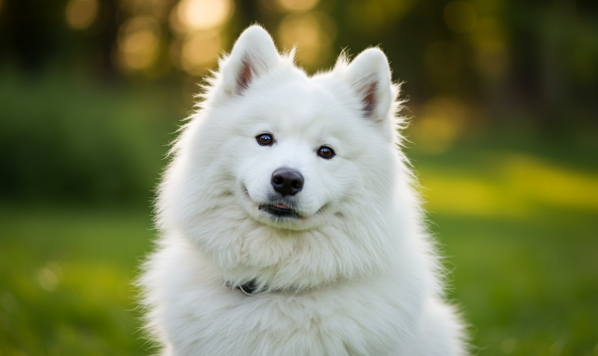
Samoyed
Samoyed Traits:
- Friendly and Social: Samoyeds are known for their gentle and affectionate nature. They love being around people and other animals.
- Intelligent and Trainable: They are smart dogs that respond well to consistent, positive training methods.
- Energetic and Playful: Samoyeds have high energy levels and enjoy physical activities like running, hiking, and playing games.
- Vocal and Communicative: They tend to be quite vocal, often using barks and other sounds to communicate.
- Thick Double Coat: Their dense, fluffy white coat requires regular grooming to prevent matting and to manage shedding.
- Strong and Durable: Originally bred for herding and pulling sleds, they are strong and have good endurance.
- Friendly with Children: Their gentle nature makes them good companions for families with children.
- Can Be Stubborn: Sometimes they show a bit of independence, so patient and consistent training is necessary.
- Needs Regular Exercise: Without enough physical and mental stimulation, they can become bored and develop behavioral issues.
Who Should Own a Samoyed:
- Active individuals or families who enjoy outdoor activities and can provide daily exercise.
- People willing to invest time in grooming and maintaining their thick coat.
- Owners who can dedicate time to training and socializing their dog from a young age.
- Those looking for a friendly, affectionate companion who thrives on human interaction.
- Not ideal for people who spend long hours away from home, as Samoyeds can suffer from separation anxiety.
- Suitable for homes with children and other pets, provided proper introductions and supervision.
In summary, Samoyeds are ideal for active, attentive owners who appreciate a loving, energetic, and social dog and are prepared for the grooming and exercise needs of this beautiful breed.
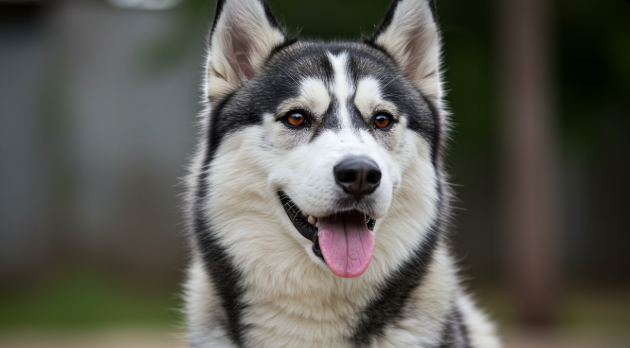
Alaskan Husky
Alaskan Husky Traits:
- Mixed breed, primarily bred for sledding and endurance
- Medium to large size, typically weighing between 35-60 pounds
- Athletic and energetic with a lean, muscular build
- Thick double coat that can vary in color and length, suited for cold climates
- High stamina and endurance, excelling in long-distance running and pulling sleds
- Intelligent, independent, and sometimes stubborn
- Friendly and social but may have a strong prey drive
- Requires significant daily exercise and mental stimulation
- Can be vocal, often howling or barking, especially if bored or lonely
Who Should Own an Alaskan Husky:
- Active individuals or families who enjoy outdoor activities such as running, hiking, or sledding
- People with experience in handling high-energy, working dog breeds
- Owners with time and commitment to provide extensive daily exercise and mental challenges
- Those living in cooler climates or with access to environments suitable for an active, cold-weather breed
- Individuals prepared to invest in training and socialization to manage independent and strong-willed traits
- Not ideal for apartment living or sedentary owners due to their high energy needs and exercise requirements
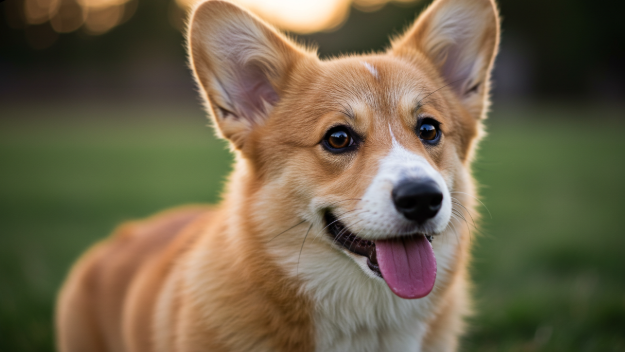
Pembroke Welsh Corgi
Pembroke Welsh Corgi Traits:
- Size: Small to medium, typically weighing 25-30 pounds.
- Appearance: Sturdy body, short legs, erect ears, and a fox-like face.
- Temperament: Friendly, affectionate, and intelligent.
- Energy Level: High energy; enjoys regular exercise and playtime.
- Trainability: Highly trainable and eager to please.
- Social Behavior: Good with children and other pets when socialized early.
- Barking: Can be vocal and alert barkers.
- Grooming: Moderate shedding; requires regular brushing.
- Lifespan: Around 12-15 years.
Who Should Own a Pembroke Welsh Corgi:
- Active individuals or families who can provide daily exercise.
- Owners willing to invest time in training and mental stimulation.
- People looking for a loyal, affectionate companion.
- Those prepared to manage moderate grooming needs.
- Suitable for homes with children and other pets if socialized properly.
- Not ideal for owners seeking a low-energy or very quiet dog.
In conclusion, there is no one-size-fits-all answer to what breed you should choose. Take time to research, meet different dogs, and consult with breeders or rescue organizations. By carefully considering your lifestyle, preferences, and the breed’s characteristics, you can find a puppy that will be a loving and compatible companion for years to come.

Leave a Reply